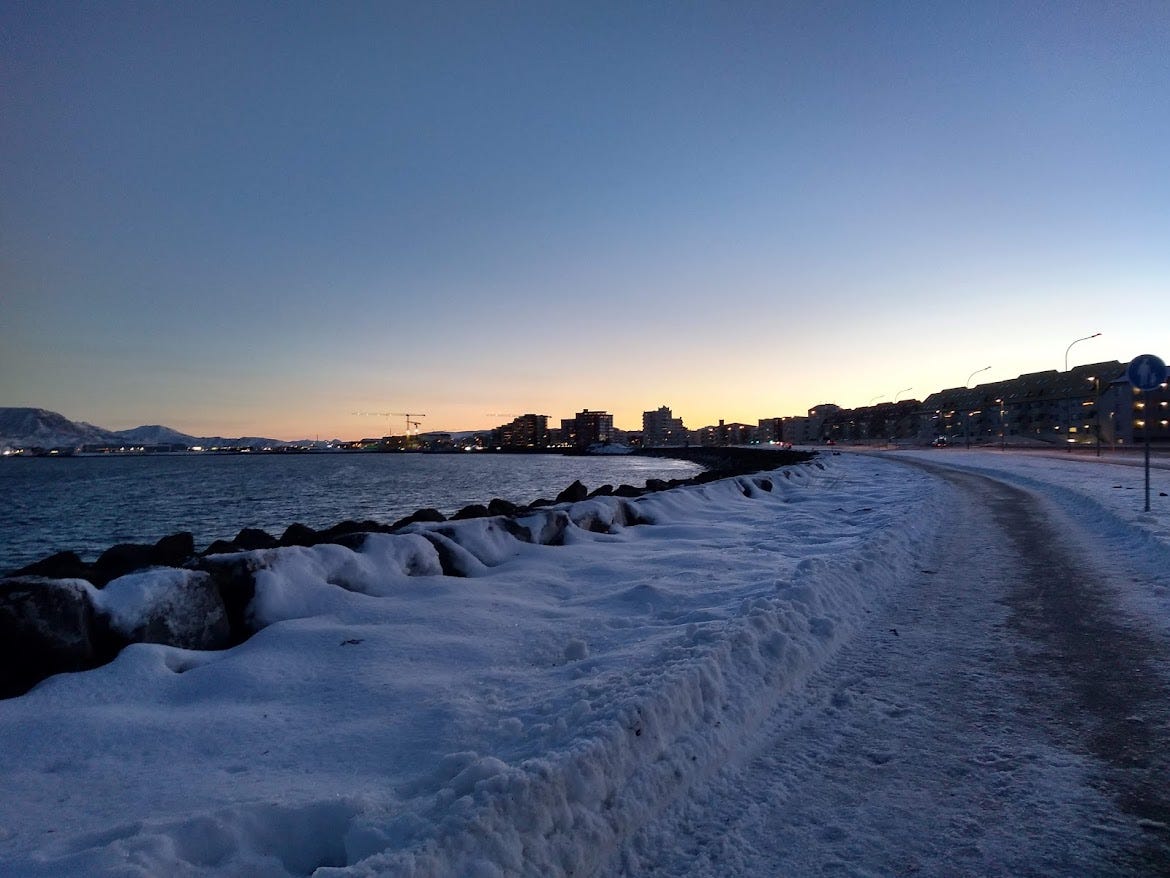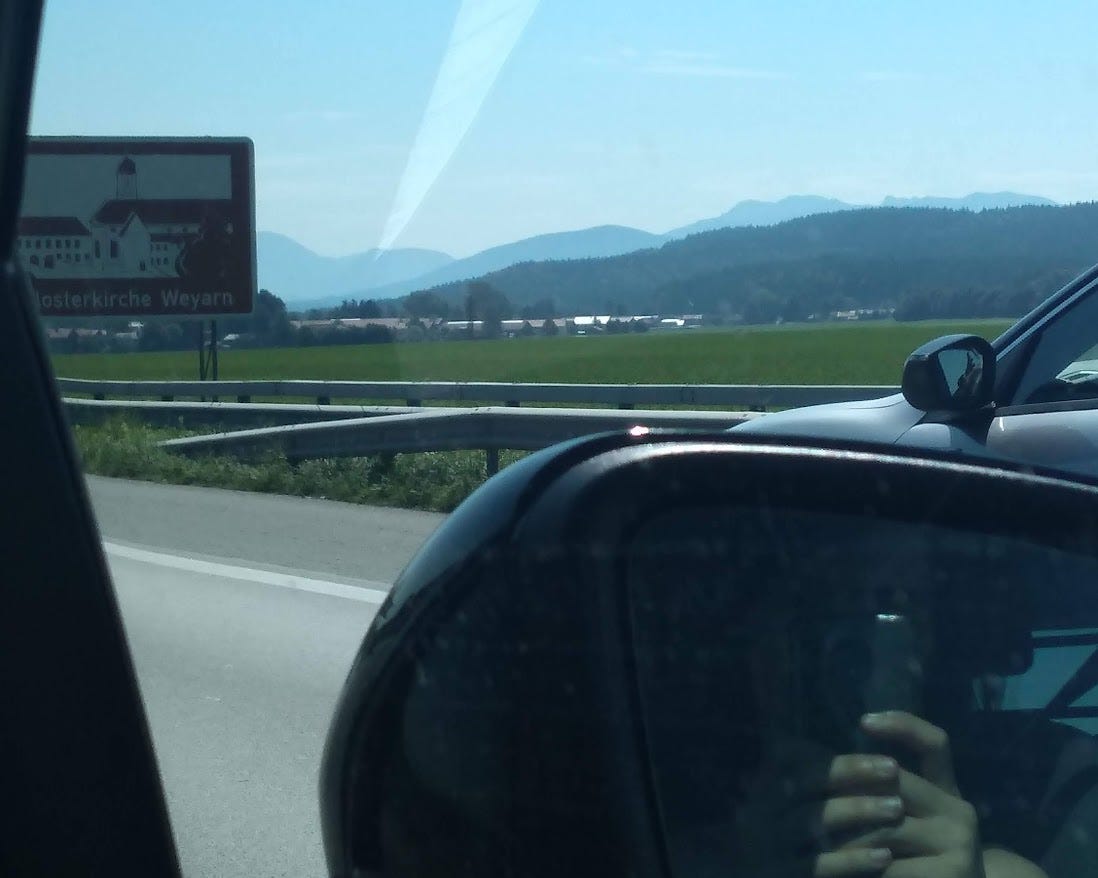Learning to love a world utterly out of control
Joy and wonder sustain us. We're allowed to be happy while we're sad.
This is not a depressing end-of-year wrap up. I thought it would be.
But I sat down at my desk in front of the waning light in grey rainy Brussels and I could not write it.
My friends are struggling. Genocide and climate disaster and famine and a fossil fuel-funded climate conference play out over Twitter and the news can be rewritten. We look at the world through a glass darkly. And the internet demands that we care about it all, all the time.
I watched it all. But I saw without seeing. My certainty that we were doomed blinded me.
I wander through Christmas markets and think of Palestine. You comment on the unseasonable December heat. We stop by a Ukrainian solidarity stall - briefly.
We ask how we can bear living in Times Like These. Everything happening around us, we feel within us. How do we navigate the day?
Nothing in 2023 is going as planned. Nothing is under control.
But the obsession with controlling ourselves and our environment has done far more harm than good throughout human history.
Two years ago my climate work depressed me. My hope for the world was shaken. Climate action was a kind of penance for the destruction the rich and powerful have wreaked.
I stood in COP26 staring at the great artificial lights and listening to their false promises. I looked on their works and despaired.
It didn’t last. Despair is boring. And impotent. You can’t paint an accurate picture of the world with one colour. You can’t live with one emotion alone. Ecosystems only survive in cooperation. To despair is to die.
In January I did something out of character. I took an impulsive flight to Iceland. I found myself staring at the dawn rising over the boundless and bare snowy skyline. Utterly alone. The sight froze me in place. I was ice.
I thought you don’t take flights, Cass, for the planet? I thought so too.
Most truths I held have been shattered. Now they slide up and down on a spectrum. This is true Always/Often/Sometimes/Never.
It’s like that Japanese pottery everyone likes to use as a metaphor. Kintsugi. Ceramics made from broken shards, turned into something new and beautiful.
But of course, you have to break something first. Starting with some of our bad habits and flawed beliefs.
How easy it is to dismiss the state of the world with certainties. We are doomed or we are saved. It gets better or it doesn’t. People are good or bad. We build a home in our beliefs and shut the doors.
Have you ever tried to kick an addiction? It’s hard to explain to those who have never done it. How this thing, this pain and truth we choose, is more bearable than being faced with unknown and uncontrollable pains.
Removing the habit leaves an absence, an adriftness. And nature abhors a vacuum. God knows what will fill it if we kick the habit of always knowing and the illusion of control over this earth.
But to see what else could take the space, we have to let go of the current structures we cling to. We must let go of the harm we know, to reach something better, something sweeter, something softer than this way of living.
And still, people trying to make changes to help the planet hesitate. They ask for certainty. Will this actually make a difference?
We try most things without the luxury of knowing. We swipe on Tinder, apply for jobs, pay that deposit - without any guarantee that we’ll find true love, the perfect job or the forever home.
Success is not the goal of seeking sustainability and justice. It doesn’t make any sense to think that way. To help the planet is to help ourselves. To plant a tree is to make it rain. To build a home is to house people who have not even been born. I am here because you are here. What happens to you, happens to me.
I used to ask what was the point of all this striving, all this work and love and rage, only to see politicians throw the efforts aside. But now I realise thinking in terms of ‘points’ is too linear for a cyclical earth.
If I ever reached Ithaca I’d probably just leave again. If I found my knight in shining armour I’d probably get bored and split ways.
Instead, I am forever in between. In between places and jobs and houses and identities and categories on forms. In between what I used to know and what I have not yet learned. In metamorphosis.
To accept that we are in between is to be like a river. I cannot wake up as the same person I was yesterday in the same world. My bed looks the same, yes, I look the same in the mirror, and yet everything has changed.
Because we are trees, you understand?
Trees can grow forever without reaching the sky. The journey is the destination. To be unlearning and changing is to be human, is to be a plant, is to be a stream, capable of constant transformation with no vestige of a beginning and no prospect of an end.
In a circular world, there is no guarantee of a happy ending because there is no ending. Isn’t that wild? Every single bad thing will eventually pass.
Someone once told me that even in the darkest days, there would be people dancing around the campfire.
I don’t mean to say that’s where we’re headed. I mean that we are as capable of shutting out beauty and happiness as we are at switching off the sun.
But we punish ourselves for wanting to have fun and switching off our phones when others are suffering. It feels paradoxical that I can have a good day in Times Like These. That even the worst atrocity cannot capture our attention forever.
What happened to my state of despair? Attempting to hold myself to a static state is futile. Of course. I am human. To be alive is to be in contradiction. We can feel grief and happiness all at once. To live is to die. We enjoy beautiful views built on the backs of human suffering. We know this, abstractly, just as we know we will die one day, but we can never truly grasp it.
Will it make a difference? Does it matter what I do?
We know to plant trees under whose shade we will never sit. To be alive is to have a part to play in this ecosystem. Every person and every emotion has its place.
We ask how we can bear these times. But we can bear a lot when we bear it together. Like an ecosystem, we must cooperate to thrive. We create moments of rest, happiness and love in the midst of ecological and social suffering as naturally and intuitively as breathing and sleeping.
Don’t believe those who seek to polarise us to the point of hatred, prejudice and murder. We are more united than divided. After all, I am because you are. We have more in common than not - and our differences are what makes life all the richer anyhow.
Highlights from The Green Fix team:
“At first I didn't want to share anything because I think 2023 has been pretty disappointing, personally and professionally. But then I realised that The Green Fix itself has been really inspiring, which is why I decided to join the team as a volunteer this year. I always believed in the power of community and TGF does manage to rekindle my faith in a better world and the power of people coming together. So I'm grateful for that and excited to see what the new year brings.”
Ana Alexandrescu, Social Media Officer
“This year, I took on new positions in climate action organisations I volunteer for, (hopefully) contributing to the work of hundreds of young people in Europe, providing them with more opportunities to advocate for a just and green transition. But most importantly, I learnt how to make an amazing vegan "meat" sauce for pasta. I'm very happy about this, because my biggest achievement has actually been to focus more on the little things that make me feel good and less on the burden of constantly trying to be productive, even if it is for a good cause. I see more yoga and brunch weekends in 2024!”
Martina Razzaboni, Partnerships and Funding Manager
“I’ve moved to a new role in The Green Fix as an assistant editor, which I’ve been loving. It’s so exciting reading all the cool stuff going on across the environmental space. Recently, I’ve been proud of how environmental networks have mobilised around Free Palestine, and conversations I’ve been having in these spaces have driven me to research much more into the inextricable links between colonisation and the climate crisis, deepening my understanding of the crisis, but also the breadth of change needed.”
Issy Pountney, Assistant Editor
“A lot has happened this year but the highlight is probably that I’ve finally found a job where I directly work on nature restoration projects. I’ve met so many passionate, dedicated people and it’s been really motivating to keep up activism outside of work!”
Nic Fife (who sells amazing prints, by the way).
“This year I have been inspired by my niece, Lexi, who has just completed her first semester at Duke University majoring in Environmental Science! She told me at least some of her inspiration to enter this field was from my interest and activism. I am grateful to have played a role. With her drive, passion, determination, commitment, and intelligence, I know she will make a substantial impact in helping to solve the climate crisis.”
Lisa Bergmann
Most-read newsletter editions of 2023
We're in deep: why do we cling to the things making us sick?
So we're supposed to think that working overtime for little pay is 'inspirational'?
Shoutouts to some of my favourite things I’ve read this year
Uprooted newsletter by @GreenDreamerKamea. I recommend the edition on ‘Diversifying anthropocentrisms.’
System change is a circle, not a waterfall. In We Can Fix It newsletter by Prof. Kimberly Nicholas.
Lessons from the foragers, by Vivek V Venkataraman.
Resisting the urge to be urgent, by Deepa Ranganathan.
Longtermism: a call to protect future generations, by Cody Fenwick.
Ithaca, by Constantine P. Cavafy.
Gen Dread by Britt Wray .
And other writers I read all year and have served as sources as inspiration and reflection: the Atmos Earth team, Emily Atkin in HEATED , Thin in Thin Ink , Joycelyn Longdon in Climate In Colour and Isabelle Drury in Finding Sanity.
Some final opportunities before we go
Looking back and letting go: a free workshop on processing 2023. Online on the 31st December at 17h CET.
Young people are invited to apply for Common Futures Conversations at Chatham House by the 1st January.
New and aspiring journalists can apply for this two-week study program in professional ethics and ethical leadership at FASPE. Deadline 2 January.
The Impact Awards are open for submissions in 12 categories until the 19th January.
People from racialised communities in Europe are invited to fill out the Climate Racism survey to shape inclusive climate agendas.
Watch/Listen: The wonder of being alive.
Read: What is environmental injustice and how does it affect Palestine?
If you’d like to support The Green Fix, please consider tipping us a virtual coffee.
Stay in the loop
The Green Fix is on Twitter @TheGreenFix, Instagram @thegreenfix_ and LinkedIn. Cass Hebron (Editor) is on LinkedIn and Instagram @coffee_and_casstaways.








I put all my climate content in a folder to deal with when I felt more ready. This was a lovely balm for delving into it 💕
Love this!!!